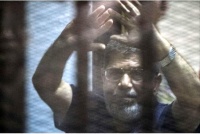Home » Reports » EGY - News » Egypt: Court of Cassation Upholding Morsi’s Sentence Despite UN Call for His Release
Dr Morsi, together with Dr Atty, Mr Sheikha and 12 other defendants, have been finally sentenced to 20 years in prison by Cairo's Court of Cassation, despite a December 2013 Opinion by the UN WGAD, which found "the deprivation of liberty of Dr. Morsi and his advisors (...) arbitrary." The Opinion, issued after Alkarama sent an urgent appeal on 15 July 2013, considered the detention of Morsi and his co-defendants to be in violation of their fundamental rights and freedoms as enshrined in international law. Namely, their right to benefit from fair trial procedures were recurrently violated.
Morsi, along with other members of his staff, had already been sentenced to 20 years in prison in April 2015 in the so-called "Presidential Palace" case, which saw him charged with the arrest, torture and use of force against demonstrators in 2012. We recall that Morsi and his staff's arrest, which was carried out by the military, was arbitrary and constituted a clear violation of both the Egyptian Constitution and domestic laws as well as international human rights law. His legal team nonetheless appealed the decision shortly after the sentence, hoping for an overturn of the sentence by the Court of Cassation. Despite the charges, however, Dr Morsi and the other defendants were not formally charged during the first days of their detention – in violation of Articles 9 and 14 of the International Covenant on Civil and Political Rights (ICCPR) ratified by Egypt in November 1989 ; their lawyers were not always present during their hearings and could not access their judicial files to prepare their defence, thereby constituting blatant impingements on several fundamental fair trial rights. Also, Morsi was reportedly detained in solitary confinement and held in a secret detention facility, which in itself qualifies this as a form of arbitrary detention. Today, he is thought to be detained in Tora prison, an information that is difficult to confirm in view of his lack of access to the outside world.
The decision of the Egyptian Court of Cassation to still uphold the sentence, regardless of the December 2013 Opinion by the UN Working Group on Arbitrary Detention, casts heavy doubts over the impartiality of the judicial system in Egypt and demonstrates the political nature of this trial. "We remain deeply concerned over the political nature of such judicial decisions and about the multiple violations that these defendants have been suffering, including deposed President Mohamed Morsi," declared Rachid Mesli, Legal Director at Alkarama. "By issuing such a sentence against the regime's political opponents – and in particular leaders of the Muslim Brotherhood – in complete disregard for the numerous irregularities in this trial and in spite of the international community's previous outcry regarding mass sentences, the Egyptian judiciary has again demonstrated that it is, in fact, just a tool at the service of the executive branch and the army."
Alkarama therefore called upon the WGAD to urgently intervene with the Egyptian authorities and call upon them to implement their Opinion, to end the judicial harassment against the victims and to release them, while providing the defendants with the correct redress for their suffering.
For more information or an interview, please contact This email address is being protected from spambots. You need JavaScript enabled to view it. (Dir: +41 22 734 1008)
 Algeria
Algeria Bahrain
Bahrain Djibouti
Djibouti Egypt
Egypt Iraq
Iraq Palestine/Israel
Palestine/Israel Jordan
Jordan Kuwait
Kuwait Lebanon
Lebanon Libya
Libya Mauritania
Mauritania Morocco
Morocco Oman
Oman Qatar
Qatar Saudi Arabia
Saudi Arabia Sudan
Sudan Syria
Syria Tunisia
Tunisia United Arab Emirates
United Arab Emirates Yemen
Yemen Other Countries
Other Countries







